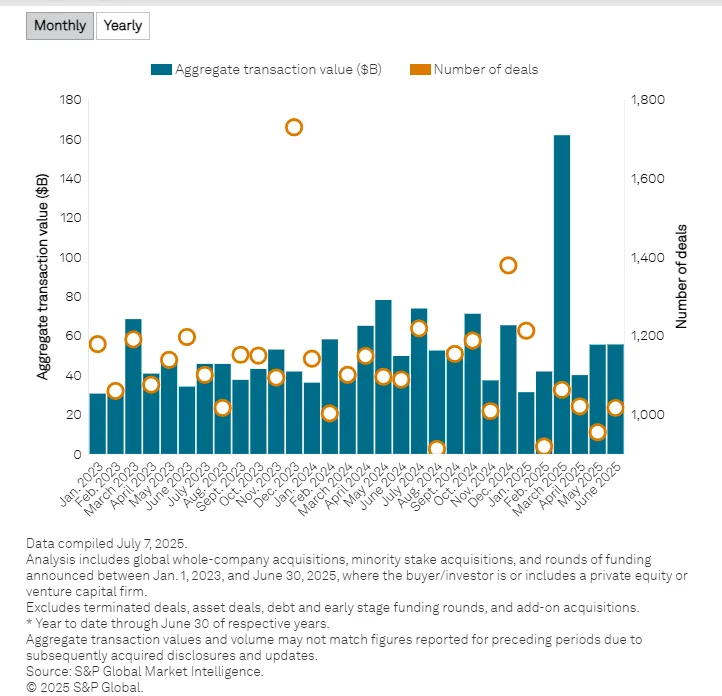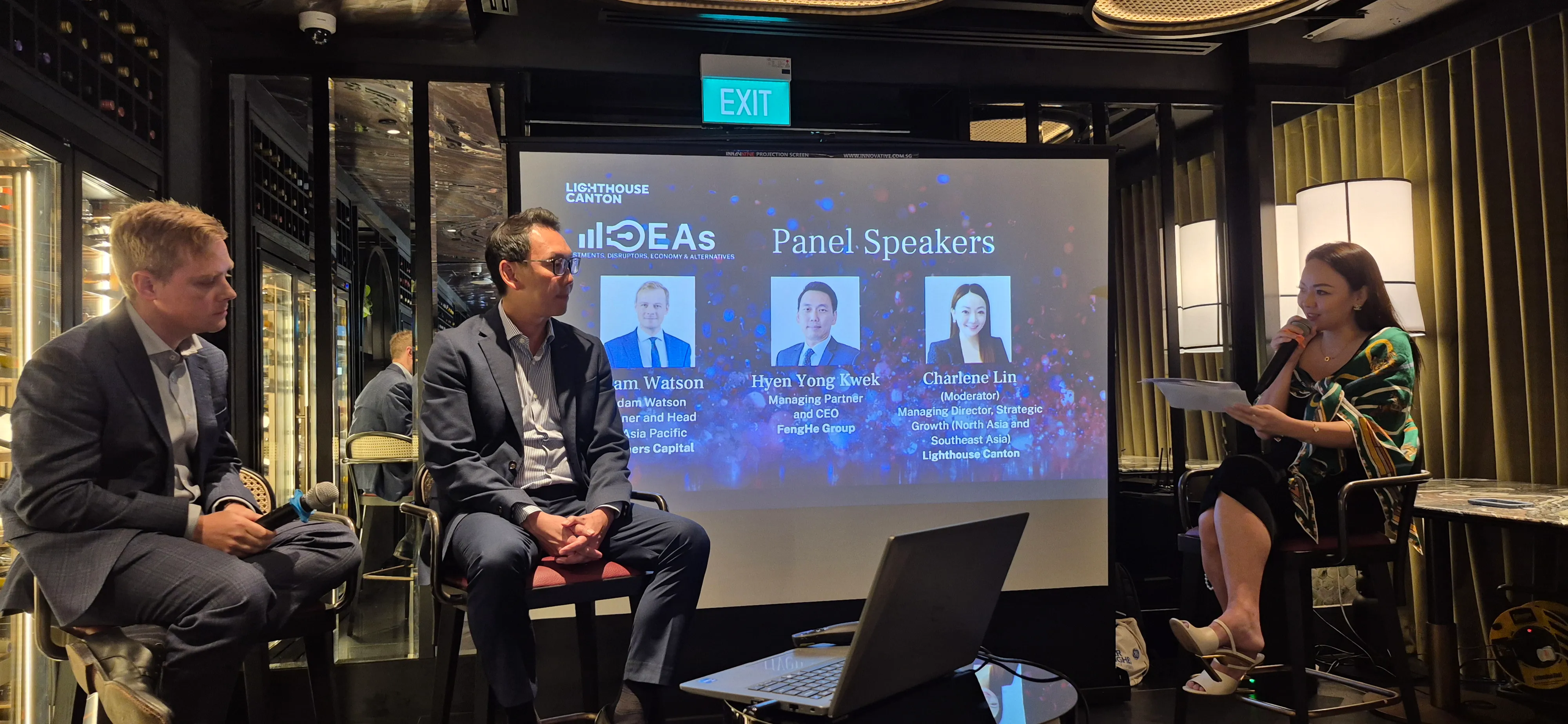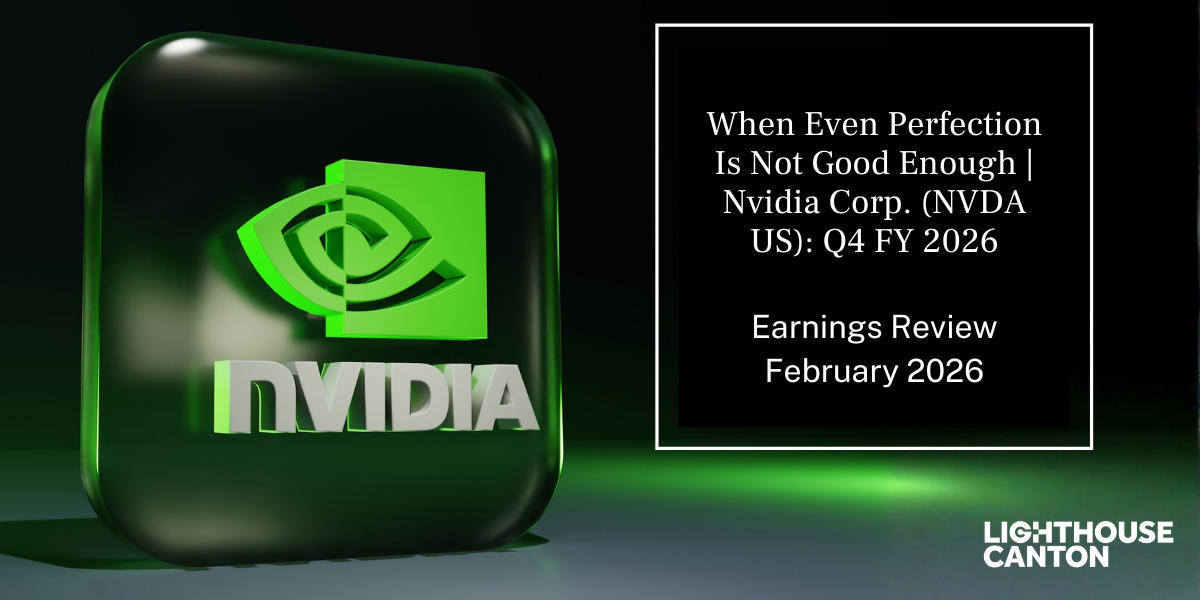Is U.S. market dominance ending—or simply evolving? In an era defined by rising interest rates, geopolitical realignment, and AI disruption, investors are revisiting what defines quality and where opportunity lies. At a panel hosted by Lighthouse Canton on July 24 at QT Hotel Singapore, industry leaders unpacked these trends with hard-won conviction.
In the discussion moderated by Charlene Lin, Managing Director, Strategic Growth (North Asia and Southeast Asia), at Lighthouse Canton, panelists Kwek HyenYong, Managing Partner and CEO of FengHe Group, and Adam Watson, Partner and Head of Asia Pacific at Partners Capital shared how their firms, though different in scope and strategy, are positioning themselves ahead of capital allocation shifts.
"The COVID drawdown years taught us that losses take double the time and effort to recover," Lin reminded the audience, explaining why many clients shifted to managers who could protect capital in adverse markets. Before diving into sector bets, she introduced FengHe, which has delivered 13% annualized returns since inception with a Sharpe ratio close to 1, and Partners Capital, which manages US$63 billion globally and has consistently outperformed top university endowments such as Yale and Harvard.
ALLOCATIONS AND PORTFOLIO GROWTH WITH RESILIENCE
Kicking off the panel, Lin invited both speakers to share their biggest conviction at the start of the year that had turned into a standout performer. She noted that while many in the market had been fixated on China’s macro swings or the AI trade, both panelists had taken less obvious but high-conviction routes.
“We built a Trump-resilient portfolio,” said Kwek.
“And one of the core themes we have is in the world of defense.”
He named Mitsubishi Heavy Industries, Hanwha Aerospace, and European defense leaders as best performers. “That basket is among the top 10 best performers in our year-to-date performance.”
Meanwhile, Watson shared how Partners Capital is staying grounded. “We’ve been returning to high-quality assets with strong management,” he said. “General Electric stock is up over 50% this year, and since 2023 is up 4x.” The team also backed a buyout of Nestlé’s water division, which engineered a reverse merger and returned “three times our capital over the last four years.”
According to S&P Global, global private equity and venture capital deal value climbed in the first half, continuing a trend of high-value yet lower-volume deals. The aggregate deal value grew 18.7% to $386.42 billion between January and June from $325.57 billion for the same period in 2024. The number of deals decreased 6% year over year to 6,188 transactions —signalling strong conviction in large-cap private equity plays amid ongoing market uncertainty.

AI and Autonomy and the China lens
The use of AI in each of the manager’s investments approaches and asset allocation processes was also a key talking point. According to a Markets Media survey, 32% of asset management firms have not yet adopted Generative AI. Among those who have, the most common uses remain limited to document synthesis (28%), data extraction (28%), and knowledge bases/Q&A (17%). The message: for most managers, AI is still experimental.
While others discuss artificial intelligence as a trend, FengHe is already executing. Kwek revealed that his firm has been building a 10-person AI team over two years. “We are trying to build an AI platform that can imitate and hopefully overtake the human investor,” he said. “It’s a little bit like trying to build an engine or system that’s akin to autonomous driving.”
We started from one piece of paper, figuring out how to emulate — and hopefully overtake — what the human investor does.”
The system is being designed to integrate the firm’s proprietary models, into algorithms that decide when to buy, sell, or short securities. There is no ready playbook: “Even the big houses aren’t public about their methods,” Kwek noted.
The firm’s secret weapon? Deep tech DNA. “It helps that our chairman is an ex-CTO of Alibaba and in the 90s, he was the chief architect at Yahoo.” That legacy allowed FengHe to attract top engineers to its undisclosed AI lab in Shanghai.
"We find that man and machine both have their pros and cons," Kwek added.
Beyond capability, AI represents a substantial investment. "When you factor in licensing, API calls, and infrastructure, AI requires significant budget planning," Kwek said.
This forward investment in AI also shapes FengHe’s geographic outlook, particularly in China. Both panelists agreed that the long-term opportunity lies in understanding Chinese companies and entrepreneurs rather than making broad macro calls on the economy.
Watson recounted a recent visit: “Despite the past eight years of economic malaise, there’s still a determination to succeed. But there’s also a breakdown in understanding between China and the West. The West underestimates Chinese tech competitiveness, while Chinese companies can underestimate the challenges of global expansion.” His team is preparing a presentation for their Global Investment Committee specifically on China AI opportunities.
For Kwek, the focus is clear: “We don’t invest in ‘China’ as a state; we invest in Chinese entrepreneurs. History shows what driven founders can achieve, just as Japanese corporates like Toyota and Uniqlo thrived despite a stagnant domestic economy in the 1990s. Today, China is producing world leaders in sectors from cancer drug discovery to AI. If you apply a stock-picking lens, you can find great companies at reasonable valuations.”
Overall, for Kwek, China persists as a complex yet compelling investment landscape, while Watson has seen significant trends in the private markets in the country, including the increasing prevalence of continuation vehicles and the growing role of secondary transactions.

Risk Premium Compression and the Flight to Liquidity
After exploring how technology and regional focus can shape the edge, the conversation zoomed out to the forces moving all markets—risk, return, and where capital is flowing next.
Watson’s macro view centered on the shrinking reward for risk.
Looking at historical returns, he explained, “If you have a look at the last 10 years, you’d have gained about 12% in passive equities versus less than 2% in cash. Going forward, we think you’re going to get something like 3.5% in cash and about 6% in passive equities.”
As a result of the compression in risk premiums, capital is shifting.
“There’s been a sort of migration into assets that have a little bit more of that security aspect,” he said. Absolute return hedge funds, private credit, and co-investments are now in focus as investors seek alternatives to traditional public markets. He added, “If you don’t think you’re going to get excess returns nesting in the public market, being more active in private equity looks attractive.”
Fee sensitivity is rising, especially amongst institutions. “If you can do more in the co-investment space, on a low fee or fee-free basis, that’s still quite attractive.”
Client loyalty, while helpful, doesn’t reduce pressure. “Those fiduciaries change every three to five years, which means they want to re-evaluate you on a very frequent basis,” Watson said.
On the liquidity side, FengHe is bucking the trend.
“We operate very friendly to money liquidity,” said Kwek. “I think we are probably one of the most, if not the most, friendly in terms of investor liquidity as an Asian hedge fund.”
He also made a clear distinction on positioning. “We see ourselves as an established manager, not an emerging manager. After 13 years of doing this, our clients have come to see us as a trusted partner.”
In the end, the panel left the room with a dual message:
Technology and geography are reshaping the investment playbook, but the real edge lies in building conviction early, whether in AI capability or in backing the right companies, wherever they are based. In the words of Kwek, “If you keep your stock-picking lens clear, there are always exceptional opportunities, even in the most misunderstood markets.”













.jpg)


%20(29).jpg)
%20(27).jpg)